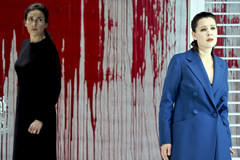| Opera Reviews | 29 April 2024 |
An arresting and entertaining eveningby Moore Parker |
|
| Gluck: Iphigénie en Aulide et Tauride Theater an der Wien 21 October 2014 |
|
|
Here the focus sees a definite shift from global power games and the threats of international strife toward the more intimate world of family drama – in this case, with a capital “D”! The depictions of oil refineries with protagonists wielding machine guns, have bowed to a hand-held pistol and ubiquitous dagger which accompany the baring of anguished male chests and blood-soaked limbs throughout the three hour plot. Typical of a certain production style, the soloists and chorus are well grouped and groomed and while intense in gesture and expression, at times appear contrived – possibly because of a certain hackneyed element. The inevitable battery-powered torches (two per person) made their appearance, but we were at least spared the Raybanned “Boesewicht” in a wheelchair. The set (Vasilis Triantafillopoulos) offers a rather clever mix of spaces on the revolving stage, concealed as required by ceiling to floor Venetian blinds – all in white, or silver to relate to the essentially black and white concept of the production. As such, visual variety was catered for, together with most effective lighting throughout (Torsten Fischer). This time round the roles of Diane and Iphigénie were shared (chronologically) between Lenneke Ruiten and Véronique Gens. Ruiten has the somewhat younger and fragile timbre (with just a touch of Ileana Cotrubas’ vibrato and shading at times), with Gens displaying the fuller mid-range and richer sound in general. Both were superb in different facets and cleverly cast for their respective tasks. Each has pure class vocally and artistically, and as such were a luxury to enjoy in one sitting. Returning to Vienna, Michelle Breedt was an intensely daunting Clytemnestre, utilizing her even-ranged mezzo and stage deportment for a generously-rounded portrayal. Christoph Pohl gave an impassioned and tireless Agamemnon, well foiled by Stéphane Degout’s Orest who displayed exceptional vocal presence and a refined sense of style. Rainer Trost was a Pylade full of conviction, courageously battling the part’s testing tessitura with considerable success. Not to be underestimated, the high-lying tenor role of Achille which Maxim Mironov well negotiated with his bright vibrant tenor leggiero, clever register combinations, and the appropriate physique. Andreas Jankowitsch was a nicely-foreboding priest (Calchas/Scythe/Le minister), and the Arnold Schoenberg Choir made (as customary in this house) an important contribution to the evening. The Vienna Symphony Orchestra under Leo Hussain could not be accused of lacking energy. While driving the drama forward the reading did, however, lack a degree of coherence and subtlety, sounding particularly plump within the intimate framework of this venue. Nevertheless, an arresting and entertaining evening in this experimental synthesis, with full marks to Torsten Fischer for his concept.
|
|
| Text ©
Moore Parker Photo © Armin Bardel |

 In Iphigénie en Aulide et Tauride Torsten Fischer has married (and condensed) his two previous Theater an der Wien productions of Gluck’s Iphiénie en Tauride (2010) and Iphigénie en Aulide (2012) - albeit with Aulide (justly) rather pulling the shorter straw in this package.
In Iphigénie en Aulide et Tauride Torsten Fischer has married (and condensed) his two previous Theater an der Wien productions of Gluck’s Iphiénie en Tauride (2010) and Iphigénie en Aulide (2012) - albeit with Aulide (justly) rather pulling the shorter straw in this package. 





